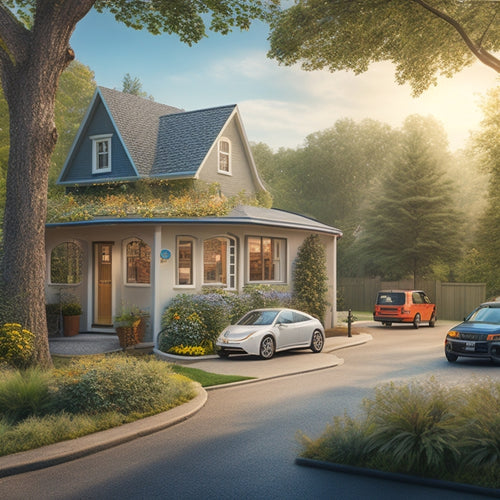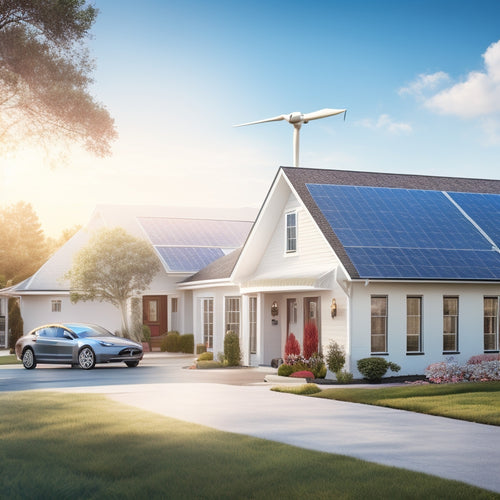
What to Know Before Installing Commercial Building Solar Panel Systems
Share
Before installing commercial building solar panel systems, you'll want to assess your energy needs by analyzing consumption patterns and identifying opportunities for reduction. Evaluate your roof's condition, age, and ability to support the additional weight of solar panels. Confirm compliance with local building codes, permits, and electrical standards. Determine the ideal system size and layout, choose the right solar panels, and select compatible inverter and mounting options. You'll also need to take into account energy storage and backup strategies, permitting timelines, and maintenance requirements. As you begin this process, you'll uncover more critical factors that will impact the success of your project.
Key Takeaways
- Assess energy consumption patterns and roof condition to determine accurate solar system sizing and potential energy savings.
- Ensure compliance with local building codes, electrical codes, and zoning regulations to avoid installation delays and penalties.
- Evaluate various solar panel options considering efficiency, warranty, durability, and certifications to maximize energy production and ROI.
- Consider energy storage and backup solutions to ensure reliable power supply during peak demand periods and grid outages.
- Develop a comprehensive maintenance and monitoring plan to optimize system performance, detect issues promptly, and ensure compliance with industry standards.
Assessing Your Energy Needs
Determining your commercial building's energy needs is an essential step in selecting the right solar panel system. You'll want to conduct an energy consumption analysis to identify your building's energy usage patterns. This involves reviewing your past utility bills and energy consumption data to determine your peak energy usage periods and overall energy demand.
By analyzing this data, you'll be able to determine the size and type of solar panel system that best suits your building's energy needs.
Conducting an energy consumption analysis will also help you identify opportunities to reduce your energy consumption and take advantage of financial incentives. Many utility companies and government agencies offer rebates and tax credits for commercial buildings that invest in energy-efficient technologies like solar panels.
By understanding your building's energy needs, you can maximize these financial incentives and create a more sustainable energy strategy.
Evaluating Roof Condition and Age
With your energy needs assessed, it's time to shift your focus to the physical aspects of your commercial building that will impact your solar panel installation. One vital aspect to evaluate is the condition and age of your roof. As you consider installing solar panels, you'll want to guarantee your roof can support the additional weight and withstand the elements.
When evaluating your roof's condition, consider the following factors:
| Roof Material Type | Structural Integrity Assessment |
|---|---|
| Asphalt Shingles | Check for signs of wear, such as curled or missing shingles, and assess the roof's overall condition. |
| Metal Roofing | Inspect for rust, corrosion, or damaged panels, and evaluate the roof's structural integrity. |
| Clay or Concrete Tiles | Look for cracks, broken tiles, or signs of wear, and assess the roof's overall condition. |
| Flat Roof (EPDM or TPO) | Check for signs of damage, such as cracks, punctures, or worn-out areas, and evaluate the roof's structural integrity. |
| Slate Tiles | Inspect for cracks, broken tiles, or signs of wear, and assess the roof's overall condition. |
A thorough evaluation of your roof's condition and age will help you determine if repairs or replacement are necessary before installing solar panels. This assessment will guarantee a safe and successful installation that meets your energy needs.
Understanding Local Building Codes
You'll need to comply with local building codes and regulations when installing commercial building solar panels. This is essential to guarantee your system meets the necessary safety standards and zoning regulations.
Failure to comply can result in costly rework, fines, or even system shutdown.
Before installing your solar panel system, make sure to review and understand the following local building codes and regulations:
- Building permits: Obtain the necessary permits before commencing the installation
- Electrical codes: Verify your system meets the local electrical codes and standards
- Fire codes: Comply with local fire codes, including clearance requirements and access paths
- Zoning regulations: Confirm that your system complies with local zoning laws and ordinances
- Safety standards: Meet the necessary safety standards for installation, maintenance, and operation
Determining System Size and Layout
Twenty-five percent of your solar panel installation's success hinges on accurately determining the system size and layout. This vital step guarantees you maximize energy production while minimizing costs. To get it right, you'll need to assess your building's energy requirements, available roof space, and local solar irradiance.
| Factor | Considerations | Impact on System Size and Layout |
|---|---|---|
| Energy Requirements | Peak energy demand, energy usage patterns | Determines total system capacity |
| Roof Space | Available area, obstructions, and orientation | Affects system size and layout configuration |
| Solar Irradiance | Local solar radiation levels, shading analysis | Influences system efficiency and energy output |
When evaluating your building's solar panel orientation, consider the ideal angle and direction for your location. A shading analysis will help identify potential obstructions, such as trees or neighboring buildings, that could impact energy production. By carefully considering these factors, you'll be able to design a system that meets your energy needs while guaranteeing a strong return on investment.
Choosing the Right Solar Panels
As you've determined the ideal system size and layout, the next vital step is to select the right solar panels for your commercial building. With numerous options available, it's important to evaluate several key factors to make an informed decision.
When choosing the right solar panels, reflect on the following:
-
Panel efficiency: Higher efficiency panels produce more power per unit area, making them ideal for limited roof space or high-energy demand.
-
Warranty options: Look for manufacturers offering extensive warranties (25 years or more) that cover performance, materials, and labor.
-
Durability and weather resistance: Assess the panel's ability to withstand harsh weather conditions, such as heavy snow, hail, or extreme temperatures.
-
Certifications and compliance: Verify the panels meet local building codes, regulations, and industry standards (e.g., UL, IEC, or ISO).
-
Manufacturer reputation and support: Research the manufacturer's reputation, customer support, and maintenance services to assure a smooth installation and operation.
Inverter and Mounting Options
Three crucial components remain to complete your commercial building's solar panel system: inverters, mounting structures, and tracking systems.
When it comes to inverters, you'll need to decide on the type that best suits your system. String inverters are the most common, connecting multiple panels in a series. However, you may also consider microinverters, which attach to individual panels, or power optimizers, which enhance energy output at the panel level. Each inverter type has its pros and cons, so it's important to weigh the benefits against your system's specific needs.
Mounting systems are another critical component, as they secure your solar panels to your building's roof or ground. You'll need to choose from fixed-tilt, tracking, or adjustable mounting systems.
Fixed-tilt systems are the most cost-effective, but may not provide the best energy output. Tracking systems, on the other hand, adjust to follow the sun's movement, maximizing energy production. Adjustable mounting systems offer flexibility, allowing you to adjust the tilt and angle of your panels as needed.
Carefully consider your building's structural integrity, local building codes, and environmental factors when selecting a mounting system.
Energy Storage and Backup
Frequently, commercial building solar panel systems require energy storage and backup solutions to guarantee a reliable and efficient power supply. This is especially important when the grid is down or during periods of high energy demand.
You'll want to take into account the following key aspects of energy storage and backup:
-
Grid integration strategies: How will your solar panel system interact with the grid, and what strategies will you use to secure a seamless shift between grid power and backup power?
-
Battery technology advancements: What type of battery technology will you use, and how will you make certain it's compatible with your solar panel system?
-
Backup power requirements: What're your backup power needs, and how will you confirm your energy storage system can meet those needs?
-
System monitoring and control: How will you monitor and control your energy storage and backup system to guarantee peak performance?
-
Scalability and flexibility: How will your energy storage and backup system adapt to changing energy demands and grid conditions?
Permits and Installation Timelines
You'll need to maneuver through the permitting process, which involves obtaining necessary approvals from local authorities before installing commercial building solar panels.
This process can be complex and time-consuming, so it's crucial to understand the overview of permits required and the timeline factors that impact installation.
Permitting Process Overview
Before installing commercial building solar panels, it's vital to maneuver through the permitting process, which can be a complex and time-consuming aspect of the project.
You'll need to confirm that your solar panel system meets all local and national regulations, and that's where the permitting process comes in.
As you traverse the permitting process, you'll need to take into account the following key factors:
-
Zoning regulations: Verify that your solar panel system complies with local zoning laws, including setbacks, height restrictions, and other requirements.
-
Environmental impact: Assess the potential environmental impact of your solar panel system, including any potential effects on local ecosystems or wildlife habitats.
-
Building codes: Confirm that your solar panel system meets all relevant building codes, including electrical and fire safety standards.
-
Electrical infrastructure: Determine whether your electrical infrastructure can support the solar panel system, and make any necessary upgrades.
-
Utility company approvals: Obtain approval from your utility company to connect your solar panel system to the grid.
Installation Timeline Factors
Maneuvering through the permitting process is only half the battle; the installation timeline also plays a critical role in determining the success of your commercial building solar panel project.
You'll need to take into account various project timeline considerations that impact solar installation logistics.
First, you'll need to secure an installation window that aligns with your building's operational schedule. This might involve coordinating with facility managers, tenants, or owners to minimize disruptions.
Additionally, you'll need to account for potential weather-related delays, making sure your installation team can adapt to changing conditions.
It's also crucial to plan for potential utility outages or infrastructure upgrades that might affect your project timeline.
You should also take into account the availability of necessary equipment and materials, as well as the installation team's workload and capacity.
Maintenance and Monitoring Requirements
You'll need to establish a regular panel inspection schedule to guarantee your commercial building's solar panels are operating at peak levels.
Additionally, you'll want to track energy output to identify any potential issues or areas for improvement.
Panel Inspection Schedule
Throughout the lifespan of your commercial building's solar panel system, regular inspections are crucial to confirm peak performance, longevity, and safety.
This proactive approach guarantees your system operates at its best, minimizing downtime and maximizing your return on investment.
To maintain ideal performance, you should schedule inspections with the following frequency:
-
Monthly: Visual inspection of the system to identify any signs of damage, debris, or malfunction.
-
Quarterly: Check the system's electrical connections, verifying they're secure and free from corrosion.
-
Semiannually: Inspect the panel's mounting system and structural integrity to ascertain they're securely fastened.
-
Annually: Perform a thorough inspection of the entire system, including inverters, combiner boxes, and monitoring systems.
-
Every 5 years: Conduct a detailed assessment of the panel's electrical performance, including voltage, current, and power output, to identify any potential issues affecting the panel lifespan.
Energy Output Tracking
As your commercial building's solar panel system generates electricity, tracking its energy output is essential to identify potential issues and optimize performance. You'll want to guarantee your system is operating at its best to maximize your return on investment. Energy monitoring systems allow you to track your energy output in real-time, providing significant observations into your system's performance.
| Parameter | Monitoring Frequency | Action Threshold |
|---|---|---|
| Energy Output | Daily | 10% below expected |
| System Voltage | Hourly | 5% deviation |
| Temperature | Quarterly | 10°C above expected |
System Performance Analysis
Every commercial solar panel system requires regular system performance analysis to confirm maximum energy production and identify potential issues before they escalate into major problems. This involves monitoring and tracking key performance metrics to make sure your system operates at peak levels.
You'll want to benchmark your system's efficiency against industry standards to identify areas for improvement.
Some essential aspects to focus on during system performance analysis include:
- Energy output tracking: Verify that your system is generating the expected amount of electricity.
- Inverter performance monitoring: Ascertain inverters are functioning correctly and efficiently.
- Panel inspection: Regularly inspect panels for damage, debris, or shading issues.
- Temperature monitoring: Track temperature readings to make certain of peak system operation.
- Efficiency benchmarking: Compare your system's performance to industry standards and similar installations.
Frequently Asked Questions
Can Solar Panels Be Installed on a Newly Constructed Building?
When you're building from scratch, you're in a prime position to integrate solar panels seamlessly, considering installation considerations from the outset and optimizing energy efficiency in your new structure's design.
Do Solar Panels Increase the Value of Commercial Property?
As you invest in solar panels, think of them as a crown jewel on your commercial property, symbolizing innovation and sustainability. You'll reap energy savings and a potential increase in property value, as appraisers recognize the long-term benefits, making your investment shine brighter than ever.
Are There Any Tax Incentives for Commercial Solar Installations?
You're eligible for federal incentives, such as the Solar Investment Tax Credit (ITC), which allows you to claim 26% of the total cost of your commercial solar installation. Additionally, you may qualify for state rebates, further reducing your upfront costs.
Can Solar Panels Be Integrated With Existing HVAC Systems?
As you "flicker" into the world of solar power, you'll find that, yes, solar panels can be integrated with existing HVAC systems, enhancing solar panel efficiency and releasing HVAC energy savings, making your building a signal of sustainability.
Will Solar Panels Void My Roof's Warranty?
You'll want to guarantee your solar panel installation doesn't void your roof's warranty; carefully review roof warranty implications and follow installation best practices to avoid any potential issues, maintaining a valid warranty for your commercial building's roof.
Conclusion
As you begin your commercial solar panel system installation, you're on the cusp of utilizing the sun's limitless energy to power your business. With careful planning and attention to detail, you'll soon be basking in the financial and environmental benefits of renewable energy. By following these essential steps, you'll steer through the process with confidence, ensuring a seamless shift to a sustainable future.
Related Posts
-

Why Go Green With Automotive Products Online?
By switching to eco-friendly automotive products online, you're taking a significant step towards reducing your carbo...
-

Why Nearby EV Conversion Shops Matter to You
Having a nearby EV conversion shop means you'll experience the benefits of a more personalized, convenient, and susta...
-

Why Homeowners Are Embracing DIY Energy Independence
By taking control of your energy needs, you're breaking free from the uncertainty of utility bills and embracing a se...


